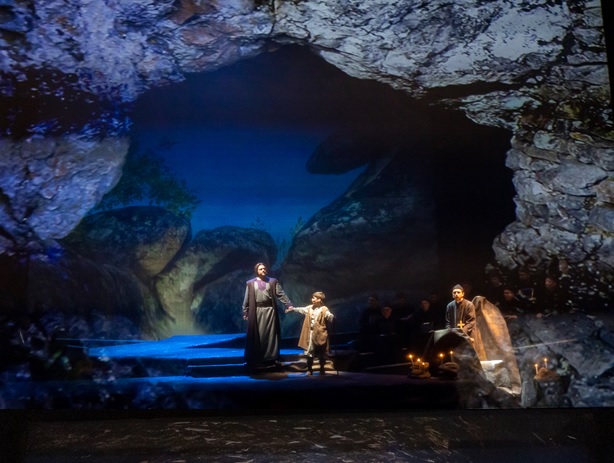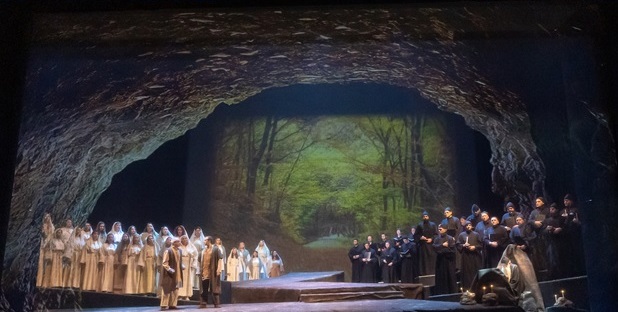
Klaus Billand
Copyright: Sofia Opera and Ballet
A musical poem as a Bulgarian drama of the soul
Bulgaria is a country with a great mysticism that is also deeply experienced by its people. You can see this everywhere in the centre of the capital Sofia, in the many Christian Orthodox churches, but also in the extensive and seemingly never-ending Roman and earlier excavations. Whoever comes to Bulgaria will sooner or later become aware of the numerous Christian Orthodox monasteries in the country and also visit the most important ones – a "must" here, so to speak. Probably the most important of these monasteries is the Rila Monastery, located relatively close to Sofia in the Rila mountain massif, which is named after Saint John of Rila, who, born around 876, after an odyssey through the forests and mountains of the country in the central Sredets region, also moved to the Osogovo Mountain, the Struma River and settled in the Vitosha Mountains and thus in the area around Rila. Here he found his last abode and was later made a saint because of his enormous importance for the self-image and probably self-esteem of Bulgaria, then a kingdom. St. John had achieved some prosperity, but renounced any worldly life and gave his goods to the poor in order to live as a hermit in caves far away from civilisation, where he was nevertheless visited and partly followed by people of similar thinking.
The Sofia Opera and Ballet, which already produced a national opera with great local content a few years ago, i.e. "Yana’s Nine Brothers" by Lyubomir Panayotov Pipkov, has now taken up the theme of "The Hermit of Rila" in a scenic adaptation by its General Director, Prof. Plamen Kartaloff and by Vera Petrova, Production Director, as a world premiere. Father Kiril Popov (1955) had composed a so-called "musical poem" to the text by Tihomir Pavlov (1880-1937). Popov studied conducting and church singing in Moscow and has been a member of the Association of Bulgarian Composers since 2012.

Copyright: Sofia Opera and Ballet
The music, with romantic basic features and determined primarily by a broad string section, leads thematically to the woods and mountains of Bulgaria – and thus to St. John's new home – which are atmospherically blended in an equally romantic sequence of images by the multimedia design of Rosen Dimitrov. They thus radiate a great inner peace, which is the main theme of the entire musical poem – the inner peace of the hermit St. John, which has a beneficial effect on others. The hermit has devoted himself completely to God and prays for his mercy and blessings for the Bulgarian people, who at that time were already experiencing inner difficulties due to struggles for power and distribution. The piece thus acts as a balm for wounds that were obviously developing among the people at the time and conveys a deep national Bulgarian identity and state of mind.
The piece has two acts, the first dealing with the life of the young John and the second with the life of the old John as a hermit. In principle, it has an oratorio style, with male choirs and smaller female choirs that essentially praise God in hymns. The choirs thus also play the first role vocally and bring about a pronounced static. However, the piece is repeatedly enlivened by operatic activities. Even the young John is sung by the talented bass-baritone Atanas Mladenov (Amfortas in Sofia, among others), which also includes longer monologues. The old John is embodied by an actor, Irinei Konstantinov, as a speaking role. However, he also repeatedly acts in dialogue with opera singers. In Act 2, for example, King St. Petar, dressed in red royal robes and wearing a crown, comes to Old John with respect but in a very withdrawn manner and asks him for advice for his government, which was in serious trouble. Angel Hristov (Hagen in Sofia, among others) sings the role royally indeed with his powerful bass.

Copyright: Sofia Opera and Ballet
At one point, the hermit's brother shows up looking for his young son Luka, who has been visiting John. The brother gets into an argument with the hermit over this. Veselin Mihaylov sings this rather operatic scene with commitment and later has to accept the death of his son by a snake bite when he tries to carry him away from the monk... One involuntarily thinks of the Erl-King. Nikolay Petrov, known in Sofia as Wotan, sings Father Auxentius, who gives the novice his first instruction. When the old John disappears in the stage mist, his life thus ended, a crowd of angels of young ladies comes and sings of his merits as well as the hope of his eternal life. As always in Sofia, the choral direction was in the proven hands of Violeta Dimitrova. The sets were created by Nela Stoyanova, the costumes by Marta Mironska and the imaginative lighting by Emil Dinkov.
His Eminence, the Metropolitan of Stara Zagora, Kiprian, a trained conductor of the Orthodox Church of this city in the center of the country, conducted the orchestra of the Sofia Opera and Ballet with great inner calm and – you could tell by the look on his face – the greatest possible respect for the composition and the very religiously structured piece. Together with the composer Kiril Popov, he also received the greatest and warmest applause at the end. The house was almost sold out, and many representatives of the Bulgarian Christian Orthodox Church were present at this world premiere. It must have been a very special experience for them...
Klaus Billand
https://onlinemerker.com/sofia-oper-und-ballett-the-hermit-of-rila-ein-musikalisches-gedicht-als-bulgarisches-seelendrama-urauffuehrung/
